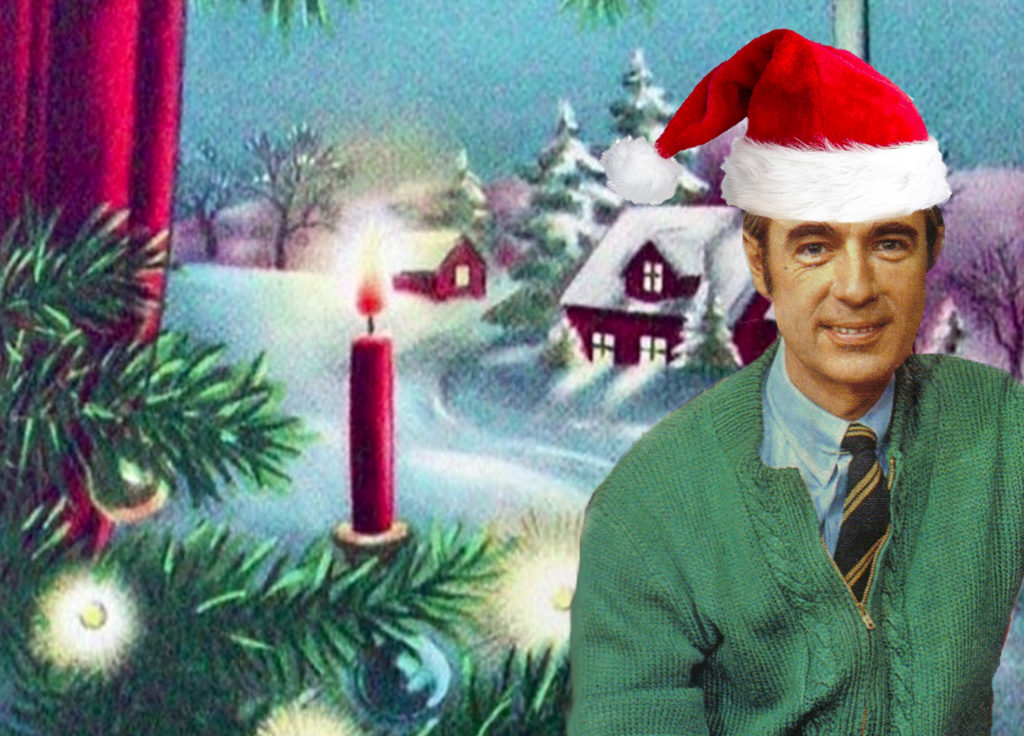
by Carol S. Hyman
Mr. Rogers is having a moment, as they say. When he was in his prime, my childhood was long past and my children not yet born, so I was only vaguely aware of who he was. To the extent I thought of him at all, I saw him as a nerdy figure, the epitome of uncool, a milquetoast male Pollyanna. I was blinded by these preconceptions for many years.
I only really woke to the true nature of Mr. Rogers last year. After watching something disturbing – it could have been most anything, with so much to choose from, but whatever it was is now long forgotten – I didn’t want to end the night with those images in mind. So I looked for something else and stumbled on the documentary, Won’t You Be My Neighbor?
After watching for a while, I began to feel anxious, expecting the inevitable clay feet to show up. But that turned out to be yet another preconception, and the documentary ended with me in tears, inspired by Fred Rogers’ odd wholesomeness and relentless display of decency. Then last week, I went to the movies for the first time in more than a year because I wanted to see Tom Hanks, an actor reputed to be quite decent himself, on the big screen as the man I’ve taken as a new hero.
I’m not alone. Though he’s been dead more than fifteen years, Mr. Rogers’ spirit is being resurrected these days by people tired of the hatred and hopelessness so fashionable in our culture now. Back when television was new, Fred Rogers saw a show for children in which adults smashed pies in each other’s faces. He thought that was sending the wrong message. Believing that television could be a force of goodness in the world, he dedicated his life to that vision and countless children, as well as quite a few adults, came to look at life, their feelings, and each other with a little more wisdom.
Last year at this time I wrote about the editor’s answer to Virginia, the little girl who wanted to know if Santa Claus was real. This year I read something that may top that perennially favorite response. It’s one of those internet stories the precise origin of which is impossible to determine, but it would be wonderful if its message went viral. I paraphrase:
A boy approached his father with determination, announcing that he’s old enough to know the truth about Santa Claus. After warning his son that you can’t unknow the truth, and hearing his son say he’s ready to handle it, the father says, “Yes, Santa is real. But he’s not a man in a red suit. You know all those presents you’ve gotten from Santa over the years? I bought those, and I didn’t care a bit about getting credit for it. Santa is an idea – and an ideal – of generosity without expecting anything in return, even gratitude. And now that you know that, you too have a responsibility to spread the spirit of Santa in the world.”
In A Christmas Carol, Ebenezer Scrooge is visited by three ghosts who, rather than preaching at him to be a better person, shuttle him through holidays past, present, and future, showing him the inevitable consequences of his hard-hearted, greedy habits. Scrooge wakes up, quite literally, to the error of his ways and becomes a force for good in the world. Fred Rogers, although he was an ordained minister, was a force for good not by preaching, but by talking. Slowly. Kindly. With respect for everything human.
One of his main messages for children, a message that many adults need to hear these days, was the importance of acknowledging your feelings. You don’t have to be afraid of them, or hide them; whatever is mentionable can be manageable, he would say. Another favorite theme was that we are all special and fine just as we are. Among other good qualities, the values of curiosity, appreciation, and compassion were practiced more than preached in the neighborhood.
Perhaps my favorite scene in the movie was when Mr. Rogers’ wife admonished the reporter writing about her husband not to call him a saint. Again, I paraphrase, but of his relentless positive attitude and kindness, she said something like “He works at it. He practices.”
Which, of course, made me think of the practice of meditation. My favorite definition of meditation is that it is the continual act of making friends with yourself. You don’t have to change yourself or be in any way different, you just have to be willing to take the time and muster the intention to look at what’s there. Kindly. Gently. Honestly.
Mr. Rogers’ Neighborhood, the regular half-hour program, ran for many years, but Fred Rogers made only one holiday special. In it, probably bearing in mind his many disparate viewers, he gave the holiday a made-up name, a nine-syllable nonsense word that the puppet, King Friday XIII, says can be translated as “what a difference one person can make.” And in it, Mr. Rogers, in the spirit of generosity without expecting anything in return, said this:
“I’ve been thinking about what I’d like to give you for Christmas. I’d really like to give you something that just fits your own wishes and needs the way these shoes just fit me. I suppose the thing I’d like most to be able to give you is hope. Hope that through your own doing and your own living with others, you’ll be able to find what best fits for you in this life…I, for one, wish you good memories of this holiday. And I hope you’ll be able to look for all the different ways that people have of showing that they love you.”
Psychologists generally agree that in order to truly love others, we must first love ourselves. Peace on earth starts with peace within. Consider giving yourself the gift of taking the time to meet your own mind. If enough of us do, future holidays may see the ghost of Santa Rogers smiling as goodness blesses us, every one. And that will be humanity having a moment!





3 thoughts on “The Ghost of Santa Rogers”
Good one Carol I I think you inspired me to go see the movie. Thanks!
Thank you, Carol, for putting into words how I have felt in the last year upon rediscovering Mr. Rogers. Such goodness and dignity and decency in a person. It reminds me that his ghost is still alive, and alive in me and many many others.
I appreciate the words about Santa. Coming from an alcoholic family, I believed in Santa the way others believed in God as I prayed to him to make my parents get along. And the only time they ever did was Christmas day. When I asked if there was really a Santa, the answer was simply no and I felt betrayed.
There is a magic and spirit at this time of year if we are present enough to catch it and I thank you so much for sharing your words and your feelings.
Lovely, Carol. I too have just “discovered Mr. Rogers. And you comment on how to approach meditation is very lovely too.